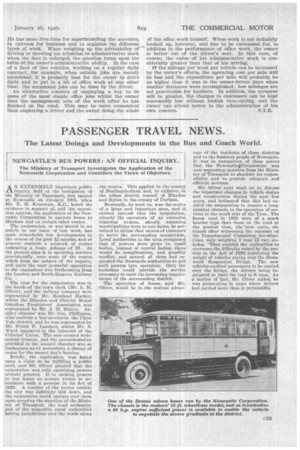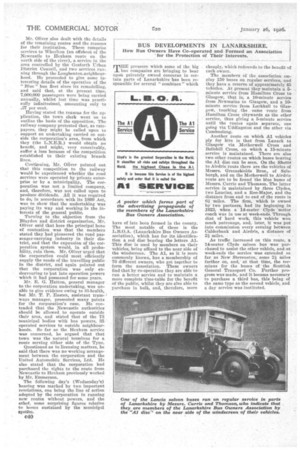PASSENGER TRAVEL NEWS.
Page 23

Page 24

If you've noticed an error in this article please click here to report it so we can fix it.
The Latest Doings and Developments in the Bus and Coach World.
NEWCASTLE'S BUS POWERS: AN OFFICIAL INQUIRY.
The Ministry of Transport Investigates the Application of the Newcastle Corporation and Considers the Views of Objectors.
AN EXTREMELY important public .inquiry, held at the instigation of the Ministry of Transport,. was opened at Newcastle on January 19th, when Mr. E. M. Kronstam, K.0., heard the evidence in support of, and the opposition against, the application of the Newcastle Corporation to operate buses to liexham and on certain other routes.
The corporation, as was 'stated in an article in our issue of last week, has made remarkable bus developments in the course of the past 12 months, and at present controls a network of routes embracing a route mileage of 87. At the present time it is operating services provisionally over some of the routeS which form the subject of the inquiry, and quite the most powerful opposition to the expansions was forthcoming from the London and North-Eastern Railway Co. • The ease for the corporation was in the hands of the town clerk (Mr. A. M. Oliver), and the railway company were represented by Mr.. Rowland Harker, whilst the Blaydon and District Molter Omnibus Proprietors' Association was represented by Mr. J. H. Staten. Another objector was Mr. Geo. Phillipsou, who'controls busirseryice4n the Clara Vale district, and he tv.as.represented by Mr. Frank F. Lambert, whilst .Mr. S. Ward appeared in the interests of the Citizens' Union. The case created widespread interest, and the accommodation provided in the council chamber was SO inadequate as to necessitate a change of venue for the second day's hearing.
Briefly, the application was based upon a claim to be fulfilling a public need, and Mr. Oliver pleaded that the . corporation was only exercising powers already granted. It is seeking powers to run buses on certain routes in accordance with a proviso in its Act of 1920. A number of the routes outside the city was definitely laid down, and the corporation could operate over them upon securing the sanction of the Ministry of Transport, the road authority, and of the respective rural authorities having jurisdiction over the roads along the routes: This applied in the county of Northumberland and, in addition, in the urban district council of Elaydon and Ryton in the county of Durham.
Newcastle, he went on, was the centre of a large and important area, and it seemed natural that the corporation, already the operators of an .extensive tramway system, should, assuming municipalities were to run buses, be permitted to utilize that means of transport to serve the surrounding countryside. Local authorities in the area recognized that if powers were given to small bodies, instead of central bodies, there would be complications, and possibly conflict, and several of them had requested the Newcastle authorities to put such powers into operation. Only the motorbus could provide the service necessary to meet the increasing requirements of the surrounding district.
The operation of buses,. said Mr. Oliver, would be to the mutual &Ivan tage of the residents of those districts and to the business people of Newcastle. IL was in recognition of these points that the Newcastle g Corporation was now requesting sanction from the Ministry of Transport to shoulder its responsibility and to provide adequate and efficient services.
Mr. Oliver next went on to discuss the important changes ia vehicle design and construction during the past few years, and intimated that this had enabled the corporation to remove a longexisting obstacle to the operation of services to the south side of the Tyne. The buses used in 1920 were of a .noich heavier type than those, on the road at the present time, the'•new units, obtained after witnessing the outcome of the Departmental Committee investiga • tions, only.weighing 3 tons 15 cwt. unladen. That enabled the .authorities to overcome the difficulty raised by the pro-Viso in the Act of 1920 restricting the weight of vehicles plying over the Scotswood Suspension Bridge. The new vehicles enabled passengers to be carried over the bridge, the drivers being instructed to limit the load to 6 tons. As a matter of fact, .Mr. Oliver added, he was prosecuting in cases where driVers had carried more than is permissible. Mr. Oliver also dealt with the details of the remaining routes and the reasons for their institution. These comprise services to Whorlton (an offshoot of the Newcastle to Hexhana route on the north side of the river), a service in the area controlled by the Gosforth Urban District Council, and two services running through the Longhenton neighbourhood. He proceeded to give some interesting details of the operation of the " Blue" bus fleet since its remodelling, and said that, at the present time, 7,000,000 passengers were being Carried annually, whilst lost. time was practically infinitesimal, amounting only to .37 per cent.
Having stated the reasons for the application, the town clerk went on to outline the basis of the opposition. The railway company protested that, as ratepayers, they might be called upon to support an undertaking carried on outside the corporation's area, from which they (the L.N.E.R.) would obtain no benefit, and might, very conceivably, suffer a loss because of the competition established to their existing branch lines. . .
Continuing, Mr. Oliver pointed out that this competition to the railway would be experienced whether the road services were operated by private enterprise or by a municipality. The corporation was not a limited company, and, therefore, was not called upon to produce dividends. All it was required to do, in -accordance with its 1899 Act, was to show that the undertaking was paying its way and working in the interests of the general public.
Turning to the objection from the Illaydon and district organization, Mr. Oliver said that here the principal bone of contention was that the members stated they had pioneered the road passenger-carrying industry in their district, and that the expansion of the corporation system would, in all probability, ruin them. Mr. Oliver urged that the corporation could most efficiently supply the needs of the travelling public in the district, and again pointed out that the corporation was only endeavouring to 'put into operation powers which it had possessed for some .years.
Mr. B. G. Hatton, general manager to the corporation undertaking, was unable to give evidence owing to ill-health, but Mr. T. P. Basten, assistant tramways manager, presented many points for the corporation's case. He contended that the Newcastle authorities should be allowed to operate outside their area, and stated that of the 73 municipal bodies with bus powers, 35 operated services to outside neighbourhoods. So far as the Hexham service was concerned, he argued that that town was the natural terminus for a route serving either side of the Tyne.
Questioned as to licensing matters, he said that there was no working arrangement between the corporation and the United Automobile Services, Ltd. He also stated that the corporation had purchased the rights to the route from Newcastle to Hexham previously worked by Mr. Emmerson.
The following day's (Wednesday's) hearing was marked by two important revelations, one being the line of action adopted by the corporation in running new routes without powers, and the othet, some surprising figures relative to losses sustained by the municipal sy,stam.




























